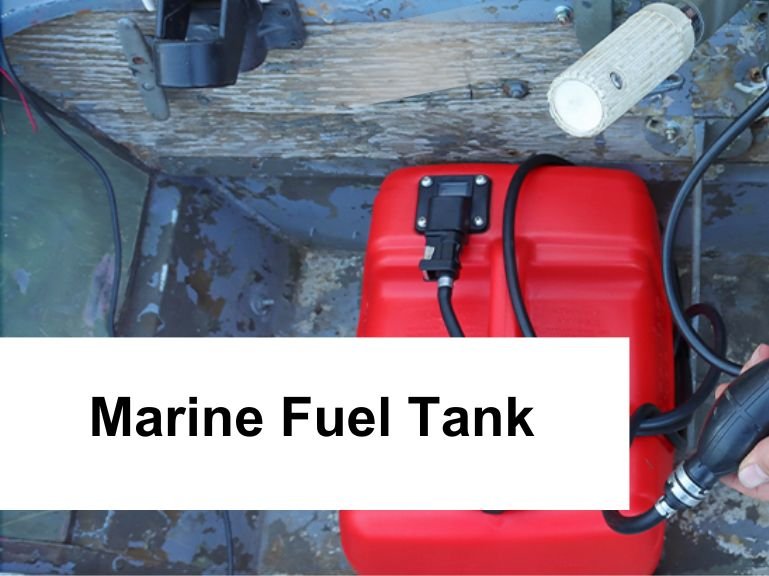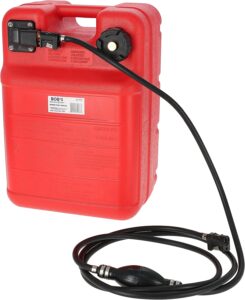Portable Marine Fuel Tank Buying Guide
When preparing your vessel the most often overlooked thing is the marine fuel tank. An additional fuel tank not only extends the range of your boat but also guarantees safety. This comprehensive guide delves into the nuances of selecting the best marine fuel tank for your adventures.

Key Takeaways
- Understanding the importance of marine fuel tanks in enhancing safety and efficiency.
- Recognizing the key features and standards for optimal fuel tank selection.
Portable Marine Fuel Tanks
Types of Marine Fuel Tanks
Marine fuel tanks primarily come in two materials – plastic and aluminum. Plastic tanks, made of durable polyethylene, are cost-effective and resistant to ethanol, making them a popular choice for smaller boats. Aluminum tanks offer better impact resistance and are suited for larger vessels, though they may be pricier and heavier.
Our Top Recommendations For Best Marine Fuel Tanks
When selecting a marine fuel tank, considering a variety of factors is crucial. Here are some top recommendations based on features, safety, and user reviews:
Scepter Marine 08667 Rectangular Fuel Tank
Known for its rugged construction and easy transport.
Attwood 8812LPG2 EPA Certified 12 Gallon Portable Fuel Tank with Gauge
Features a built-in vacuum valve and meets stringent EPA and CARB regulations.
BISupply Boat Gas Tank Kit 6 Gallon
– Offers easy filling options and is ideal for small engines.
Selecting the Best Marine Fuel Tank: A Comprehensive Guide
Capacity and Size Considerations
Choosing the right capacity is a balancing act. While larger tanks extend range, they add weight and may affect your boat’s performance. A medium-sized tank is often the safest bet, offering enough fuel without compromising the boat’s stability.
Material Choices
The choice of material impacts the tank’s longevity and performance. While polyethylene is light and less expensive, aluminum offers durability and resistance to harsh marine conditions. Consider your boat’s size and type when deciding between these materials.
Shape and Design
The shape of a fuel tank is more than just an aesthetic choice; it affects the storage capacity, fuel efficiency, and safety. A well-designed tank ensures even fuel distribution, preventing imbalance and potential safety issues.
Filling and Dispensing Options
Efficient filling and dispensing systems are vital for reducing spillage and ensuring fast fuel delivery. This aspect is crucial not just for convenience but also for environmental safety.
This section provides a detailed look into the types, benefits, and factors to consider when choosing a marine fuel tank. The next part will explore safety measures, certifications, and top marine fuel tank recommendations.
Safety and Compliance in Marine Fuel Tanks
Certification and Regulations
When selecting a marine fuel tank, it’s essential to choose one that complies with safety regulations. Look for certifications from the EPA, CARB, ABYC, and NMMA. These certifications ensure the tank meets stringent safety standards and is suitable for marine environments, safeguarding your vessel and the marine ecosystem.
Safety Tips for Using Marine Fuel Tanks
Regular maintenance and proper usage are key to ensuring safety. Regularly inspect your tank for leaks or damage, especially before long trips. Store the tank in a cool, dry place, and always follow the manufacturer’s guidelines for filling and storing fuel to prevent accidents and ensure longevity.
FAQs on Marine Fuel Tanks
What is the Maximum Capacity of a Marine Fuel Tank?
The capacity varies significantly, with small boats typically having 20 to 30-gallon tanks and larger vessels having much larger capacities. The right size depends on your vessel’s range and intended use.
What Materials are Used in Marine Fuel Tanks?
Common materials include aluminum, stainless steel, and HDPE. Each has its advantages, such as aluminum’s lightweight and corrosion resistance, making it ideal for small boats. Stainless steel is more suited for larger, commercial vessels.
How Often Should Fuel Tanks be Inspected?
It’s recommended to inspect your marine fuel tank at least annually. Frequent checks are advisable depending on the tank’s size, location, and usage patterns.
Are There Regulations for Marine Fuel Tanks?
Yes, marine fuel tanks are regulated by bodies like the EPA and ABYC in the United States. These regulations cover aspects like tank construction, venting, and safety measures for fuel spills and leaks.
Are Fuel Tanks Included in a Basic Marine Tool Kit?
Yes, fuel tanks are considered marine tool kit essentials. It’s crucial to have a portable fuel tank on board to keep your boat running smoothly. Having a backup is always a good idea in case of emergency. It’s an essential piece of equipment for any boater.
Conclusion
Selecting the right marine fuel tank is a critical decision for any boat owner. By considering factors like capacity, material, shape, and safety certifications, you can ensure a safe and efficient journey on the water.



